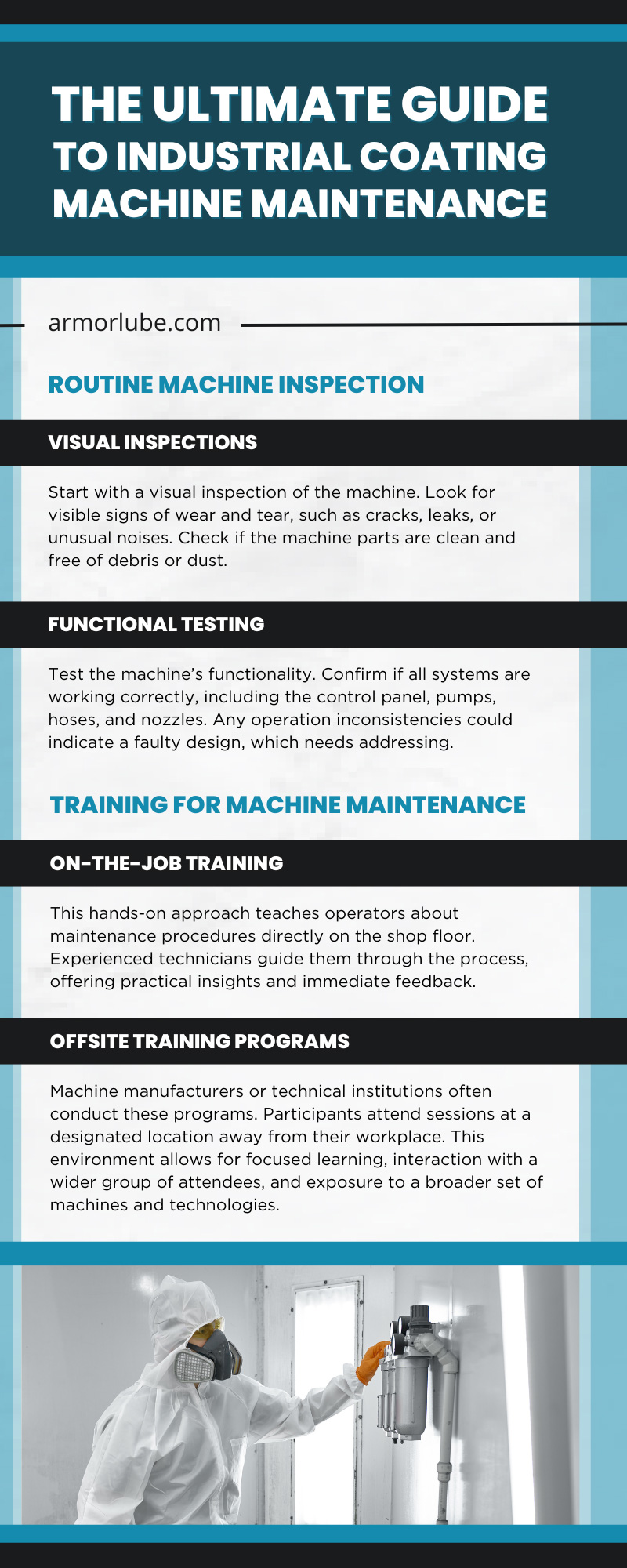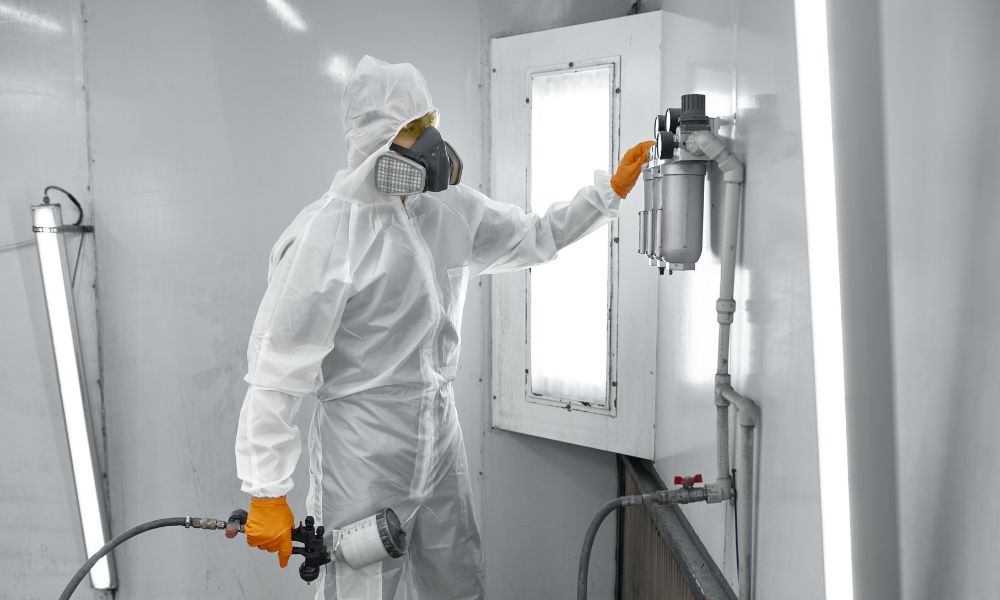Industrial coating machine maintenance is crucial to ensuring the smooth operation and optimal performance of these powerful tools. Our ultimate guide to industrial coating machine maintenance assists in improving the comprehension of how vital routine maintenance is for work operations.
Understanding Industrial Coating Machines
An industrial coating machine puts coating protectors on different machine parts. While this may sound straightforward, these machines employ advanced technologies and mechanisms to ensure precise and consistent coatings. Gaining a comprehensive understanding of the inner workings of industrial coating machines is crucial for implementing effective maintenance practices and maximizing their performance.
The Importance of Regular Machine Maintenance
Regular machine maintenance is beneficial because it directly impacts productivity and cost-efficiency. Routine maintenance minimizes downtime, reduces the risk of breakdowns, and extends the lifespan of industrial coating machines by ensuring the smooth functioning of components. Inadequate care can lead to costly repairs, decreased productivity, and compromised coating quality.
Preventive Maintenance Strategies
Implementing preventive maintenance is key to maximizing the performance and longevity of coating systems. Create a maintenance schedule, conduct regular inspections, and perform necessary activities to prevent issues before they arise. Developing a preventive maintenance schedule and adhering to it helps businesses identify potential problems early and take corrective measures.
Routine Machine Inspection
Regular inspections reveal potential issues and allow businesses to maintain optimal machine performance. Components such as pumps, filters, hoses, and nozzles are worth inspecting at regular intervals. Thorough and effective inspections involve visual checks, functional tests, and adherence to manufacturer guidelines.
It’s critical to adhere to the many machine inspection guidelines. Look below for details on various inspections to ensure workers can efficiently examine industrial equipment.
Visual Inspections
Start with a visual inspection of the machine. Look for visible signs of wear and tear, such as cracks, leaks, or unusual noises. Check if the machine parts are clean and free of debris or dust.
Functional Testing
Test the machine’s functionality. Confirm if all systems are working correctly, including the control panel, pumps, hoses, and nozzles. Any operation inconsistencies could indicate a faulty design, which needs addressing.
Follow Manufacturer Guidelines
Always adhere to the manufacturer’s guidelines for inspection. Each machine model may have unique inspection requirements.
Maintain an Inspection Log
A qualified employee must complete a record log of all inspections, noting any issues found and actions taken. Ensuring teams maintain an inspection log helps businesses track the machine’s maintenance history and future references.
Safety Compliance
Inspections should also include a safety compliance review. Ensure safety devices are functional and the machine operates safely and in a manner that is consistent with the manufacturer’s instructions and safety standards.
Cleaning and Lubrication
Thoroughly cleaning and lubricating industrial equipment is essential for ensuring their smooth operation and longevity. Regular cleaning removes accumulated debris and contaminants, preventing clogs and enhancing performance. Lubrication reduces friction, minimizes wear and tear, and ensures all machine parts function correctly.
Repair and Replacement Procedures
Some machine components may need replacement parts or repairs now and then, so identifying common parts that frequently need attention—such as seals, valves, and gaskets—is crucial. Following proper repair and replacement procedures ensures optimal functionality and prevents further damage.
Responding to Repair and Replacement Procedures
Professionals should adopt a systematic and thorough approach when responding to repair and replacement needs. Workers should first ensure the machine is off before carefully inspecting the equipment for damaged or worn-out parts to confirm whether a repair or replacement is necessary.
Try not to attempt a repair, no matter how fixable it appears. Unless trained, follow the manufacturer’s instructions meticulously to restore the component to its operational state. If replacement is necessary, source parts from credible suppliers to ensure compatibility and quality.
Even if you fix the damaged area yourself, it is necessary to meticulously document all repair or replacement procedures in a maintenance log for future reference. Safety should always be the primary concern throughout the repair and replacement process. Have trained personnel handle these tasks to avoid mishaps and ensure the repairs are accurate and safe.
Training for Machine Maintenance
Training machine operators in maintenance procedures can equip operators with the knowledge and skills to conduct routine inspections, perform basic maintenance tasks, and recognize signs of potential issues. Regular training updates keep operators aware of the latest maintenance practices.
Several training options are available for machine maintenance, with each catering to different learning styles and organizational needs.
On-the-Job Training
This hands-on approach teaches operators about maintenance procedures directly on the shop floor. Experienced technicians guide them through the process, offering practical insights and immediate feedback. This method effectively understands real-world challenges and nuances of the specific machine in the workplace.
Offsite Training Programs
Machine manufacturers or technical institutions often conduct these programs. Participants attend sessions at a designated location away from their workplace. This environment allows for focused learning, interaction with a wider group of attendees, and exposure to a broader set of machines and technologies.
Online Training Courses
Online courses are increasingly popular options today. These courses offer flexibility, allowing participants to learn at their own pace and convenience. They include video tutorials, interactive modules, and online assessments, making learning engaging and measurable.
Webinars and Workshops
Webinars present an opportunity to learn from industry experts without geographical constraints. Workshops, on the other hand, are typically more interactive and hands-on. Both these options provide avenues for discussion, questioning, and the exchange of ideas.
Manufacturer Training
Many machine manufacturers offer specialized training for their products. This training suits the specific machine model and provides in-depth knowledge about its operation, maintenance, troubleshooting, and safety procedures.
All these training options can be effective for different scenarios, and often, combining them works best. Choosing the right training option depends on factors such as the complexity of the machine, operator skill level, and available organization resources.
Maintaining Compliance With Safety Standards
Adhering to safety standards is of utmost importance when maintaining industrial coating machines. Familiarize your team with safety regulations specific to industrial coating machines and implement necessary precautions to ensure a safe working environment. Regular audits and assessments help maintain compliance and minimize the risk of accidents.
Regular maintenance is the key to preserving industrial coating machines’ performance, efficiency, and lifespan. By understanding this guide to industrial coating machine maintenance, businesses can ensure optimal performance and longevity of their industrial coating machines. Invest in regular maintenance to protect your investment and maximize productivity.
To learn more about industrial coating machines and how proper maintenance can benefit your business, contact Armorlube. We’re a team of friendly coating specialists who always want to speak with customers and learn about their goals. Our coating equipment can properly coat every part of your industrial machinery, so you don’t need to worry about consistent repairs and replacements. Let’s apply a coat of protection to your machinery and watch your warehouse operations improve!

